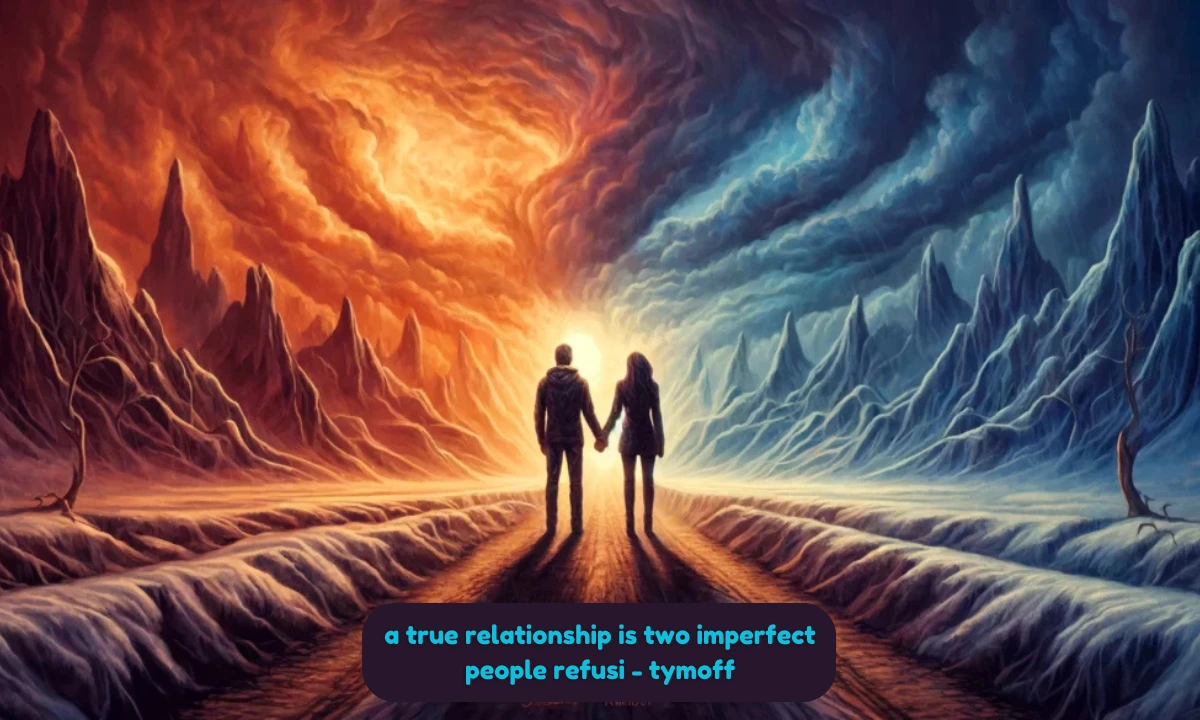In a world that often idolizes perfection, the idea of a true relationship can seem daunting. Many are led to believe that love should be flawless, filled with grand gestures and picture-perfect moments. However, as Tymoff aptly states, a true relationship is not about two perfect people but rather two imperfect individuals who refuse to give up on each other. This perspective can be liberating and grounding, reminding us that the essence of love lies in acceptance, growth, and resilience.
Embracing Imperfections
Every person carries a unique set of flaws and idiosyncrasies. Whether it’s a penchant for leaving dirty dishes in the sink or a tendency to forget important dates, these imperfections make us human. In a true relationship, acknowledging and embracing these flaws fosters a sense of authenticity. Instead of striving for an unattainable ideal, partners can build a foundation of trust and vulnerability.
Growth Through Challenges
Relationships are rarely without challenges. Conflicts, misunderstandings, and personal struggles are inevitable. However, it is how couples navigate these obstacles that define their bond. When both partners are committed to working through difficulties, they create opportunities for growth. Each challenge faced together can deepen understanding and strengthen the connection, proving that love is a journey rather than a destination.
The Power of Acceptance
True love is not about changing the other person but about accepting them as they are. This acceptance encourages open communication and honest discussions about needs and desires. When both partners feel seen and valued, they can work together to build a relationship that honors their individuality while fostering unity. This dynamic empowers both people to grow within the relationship without fear of judgment.
Refusing to Give Up
The commitment to refuse to give up on each other is what truly sets apart a resilient relationship. Life can throw unexpected curveballs, but couples who stand by one another during tough times forge a bond that is difficult to break. This commitment goes beyond romantic love; it embodies friendship, respect, and unwavering support. It means showing up for one another, even when things get tough.
Finding Strength in Vulnerability
Vulnerability is often seen as a weakness, but in the context of a true relationship, it is a strength. When partners allow themselves to be vulnerable, they create a safe space for open dialogue and emotional intimacy. Sharing fears, dreams, and insecurities allows for a deeper connection, transforming a relationship into a sanctuary where both individuals can be their authentic selves.
Conclusion
A true relationship is not about two perfect people but about two imperfect souls willing to work together, accept each other, and refuse to give up. It’s about embracing the messiness of life and finding beauty in the imperfections that make each individual unique. By fostering acceptance, resilience, and vulnerability, couples can create a love that is genuine, fulfilling, and enduring. So, let us celebrate the imperfections that make relationships real, reminding ourselves that true love is found in the journey, not the destination.
FAQs
1. What does it mean when we say that a true relationship involves two imperfect people?
A true relationship recognizes that no one is perfect. It means embracing each other’s flaws and shortcomings while working together to build a loving and supportive bond.
2. How can accepting imperfections strengthen a relationship?
Acceptance fosters an environment of trust and safety, allowing both partners to be their authentic selves. When individuals feel accepted, they are more likely to communicate openly, leading to deeper intimacy and understanding.
3. Why are challenges important in a relationship?
Challenges are opportunities for growth. Overcoming difficulties together can strengthen the bond between partners, deepen their understanding of each other, and cultivate resilience in the relationship.
4. What role does communication play in accepting imperfections?
Open communication is essential for discussing needs, expectations, and feelings. It helps partners navigate their imperfections and work towards solutions together, reinforcing their commitment to one another.
5. How can partners refuse to give up on each other during tough times?
Refusing to give up involves actively supporting each other, prioritizing the relationship, and finding ways to resolve conflicts. It requires dedication, patience, and a willingness to work through challenges as a team.
6. What is the importance of vulnerability in a relationship?
Vulnerability allows partners to share their true selves, fostering emotional intimacy and connection. It helps build trust and encourages both individuals to support one another through challenges and insecurities.
7. How can couples build resilience in their relationship?
Couples can build resilience by maintaining open lines of communication, practicing empathy, setting shared goals, and regularly checking in on each other’s emotional well-being. Celebrating small victories together also strengthens the bond.
8. Is it normal to have conflicts in a relationship?
Yes, conflicts are a normal part of any relationship. What matters is how couples handle these conflicts. Healthy communication and a willingness to find solutions can lead to growth and a stronger connection.
9. How can partners show appreciation for each other’s imperfections?
Partners can show appreciation by acknowledging each other’s strengths, expressing gratitude, and offering support when flaws become challenging. Celebrating differences and unique qualities can reinforce love and acceptance.
10. Can a relationship survive if one partner feels overwhelmed by the other’s imperfections?
It is possible, but it requires open communication and a willingness to address concerns. Seeking support from a counselor or therapist can also help partners navigate feelings and find constructive ways to cope with overwhelming emotions.
Feel free to adjust or expand upon these FAQs to better fit your article or specific audience!











